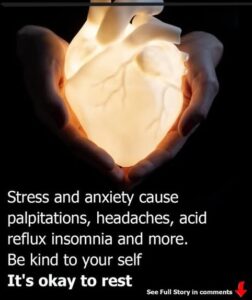Symptoms Caused by Stress and Anxiety

Stress doesn’t just affect the mind—it leaves clear marks on the body as well. When pressure builds up, our system reacts in ways that can become painful and disruptive if left unchecked. Here are some of the most common physical symptoms caused by stress and anxiety, along with ways to manage them.
1. Muscle Tension
One of the earliest physical signs of stress is tight, aching muscles. The body instinctively goes into “defense mode,” causing muscles—especially around the neck, shoulders, and back—to contract. Over time, this constant strain can lead to stiffness, soreness, and even chronic pain.
✅ What helps: Simple practices like daily stretching, gentle yoga, warm baths, or relaxation exercises can release built-up tension and keep muscles flexible.
2. Headaches
Stress is one of the biggest culprits behind tension headaches. When the muscles in the scalp and neck tighten, it creates a heavy, pressure-like sensation around the head. For some, prolonged stress may even set off more severe migraines, making it difficult to concentrate or carry out daily tasks.
✅ What helps: Techniques such as deep breathing, mindfulness meditation, and regular physical activity can ease the mental load and reduce headache frequency. Staying hydrated and taking short breaks during the day also make a difference.
3. Digestive Problems
The gut is extremely sensitive to emotional strain. Stress can throw digestion off balance, leading to stomach cramps, nausea, diarrhea, or constipation. For people with existing conditions like irritable bowel syndrome (IBS) or acid reflux, stress often makes symptoms worse.
✅ What helps: Maintaining a balanced diet, drinking enough water, and cutting down on caffeine, alcohol, or overly processed foods can support digestive health. Pairing these habits with relaxation strategies helps calm both the stomach and the mind.
👉 Stress may be unavoidable, but recognizing how it shows up in the body is the first step toward managing it. With consistent self-care and stress-relief strategies, these symptoms can be reduced and overall well-being improved.